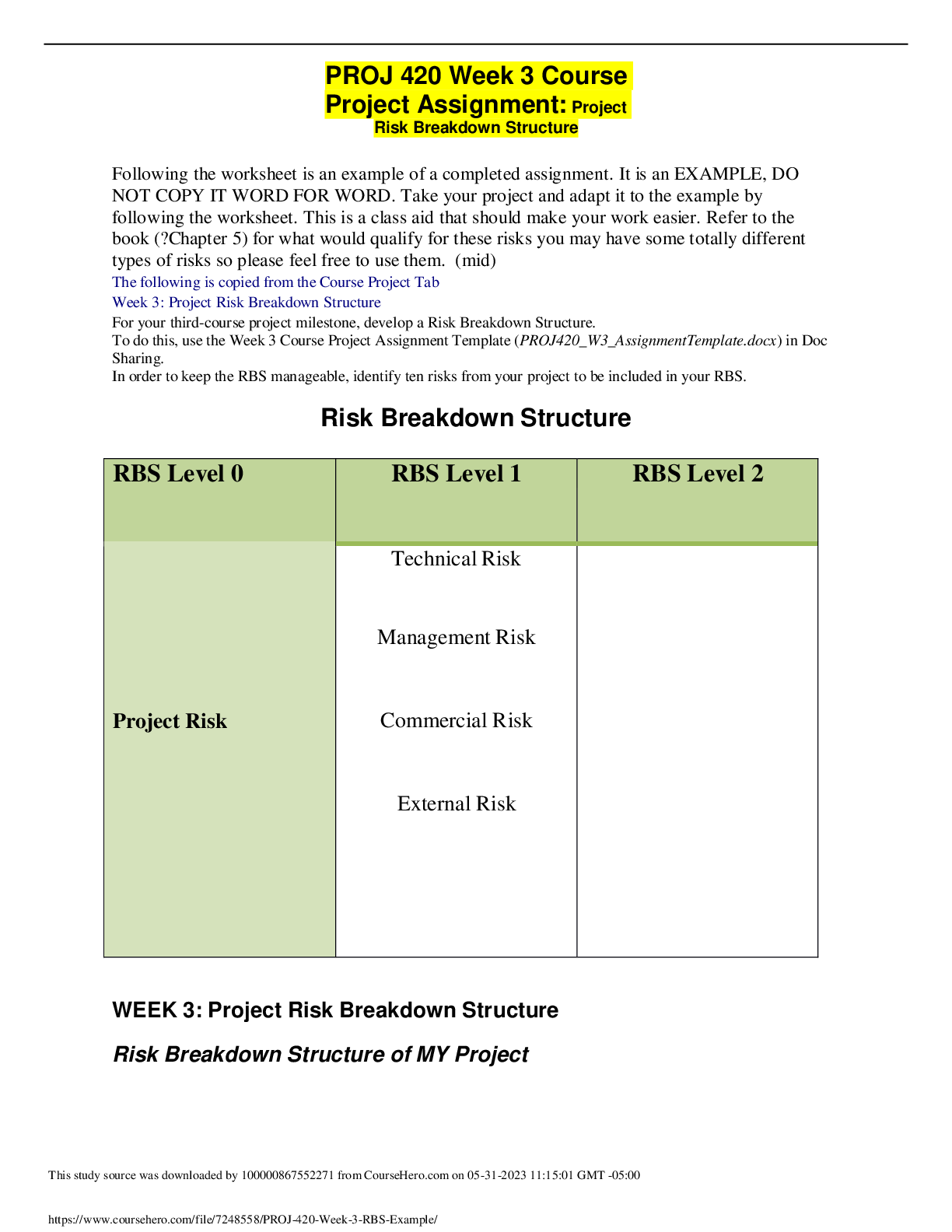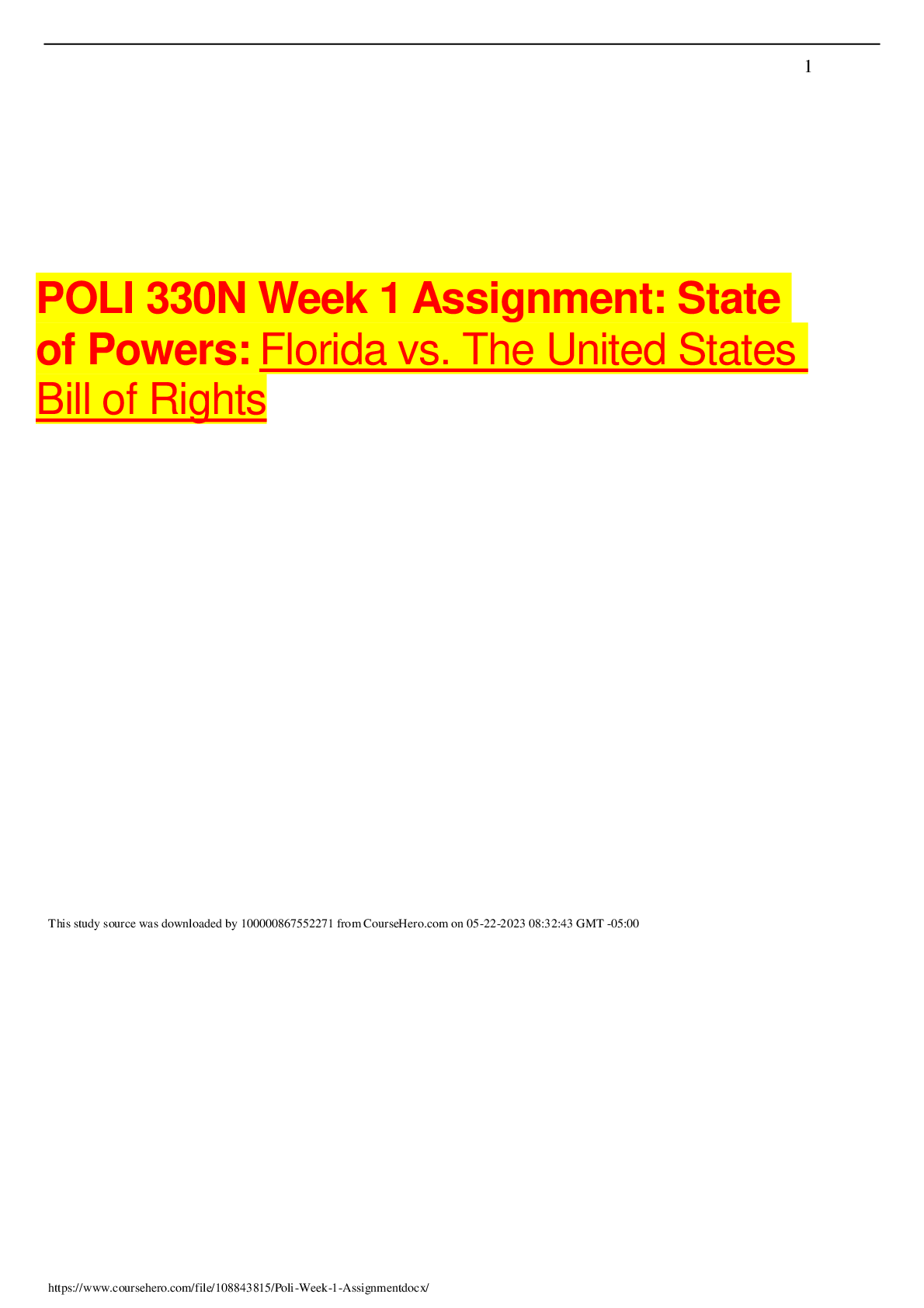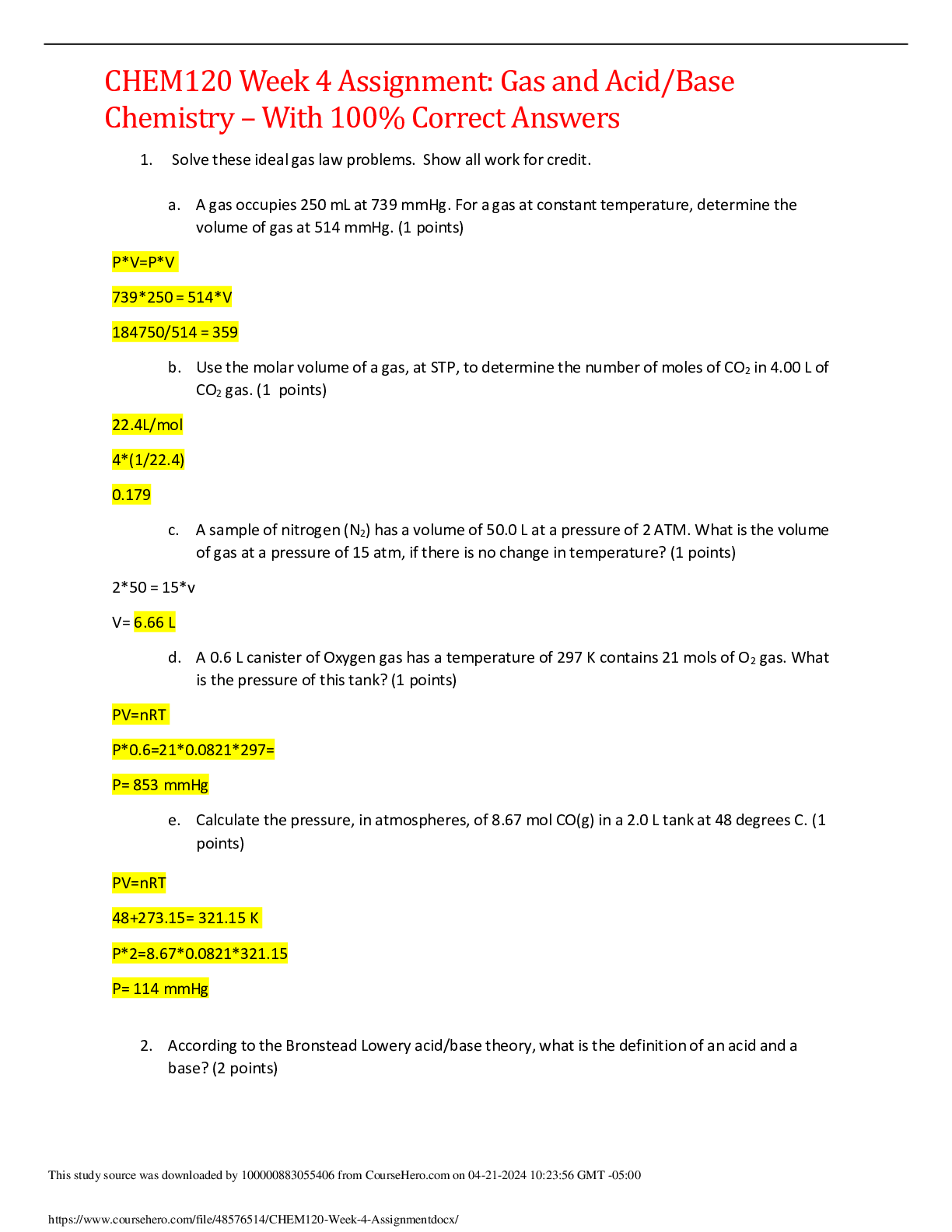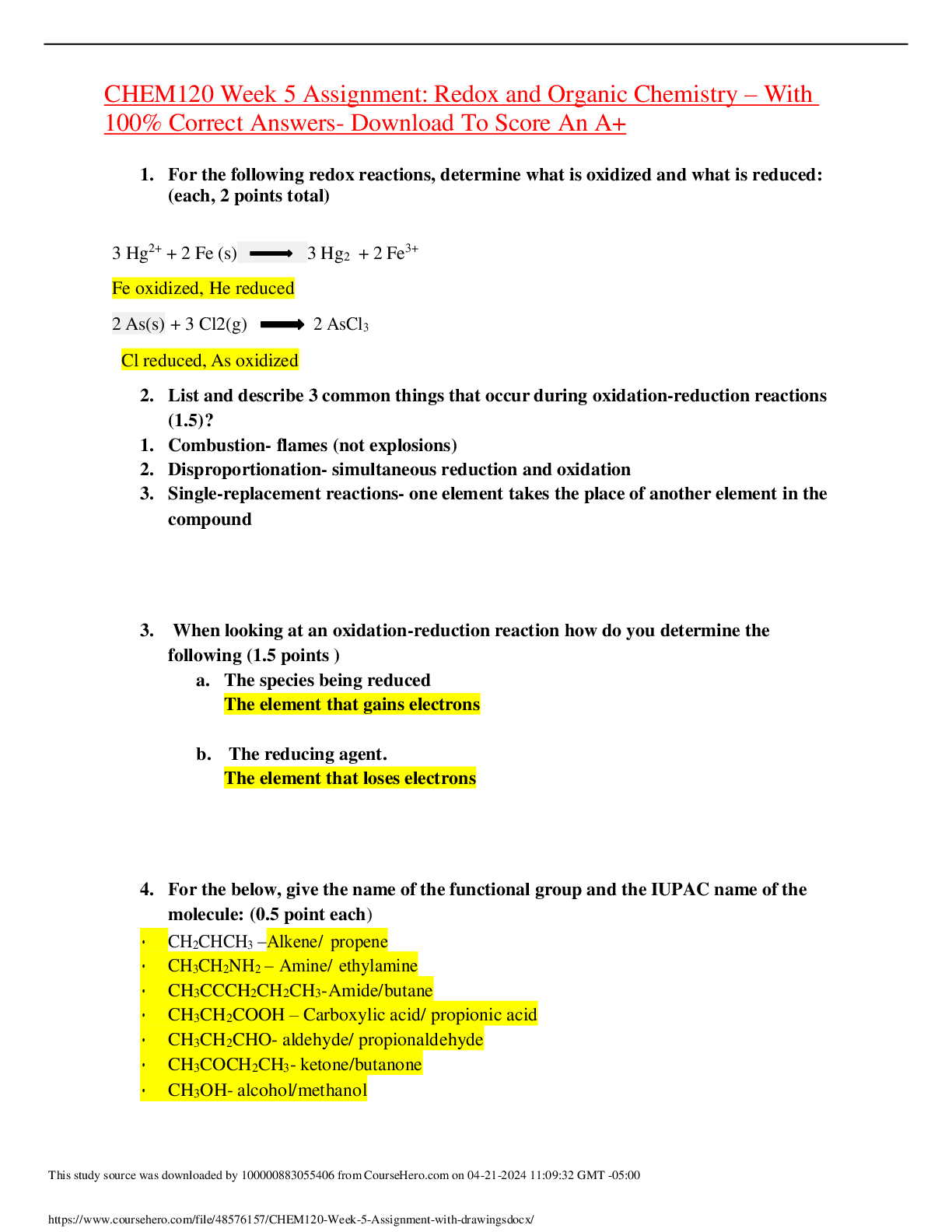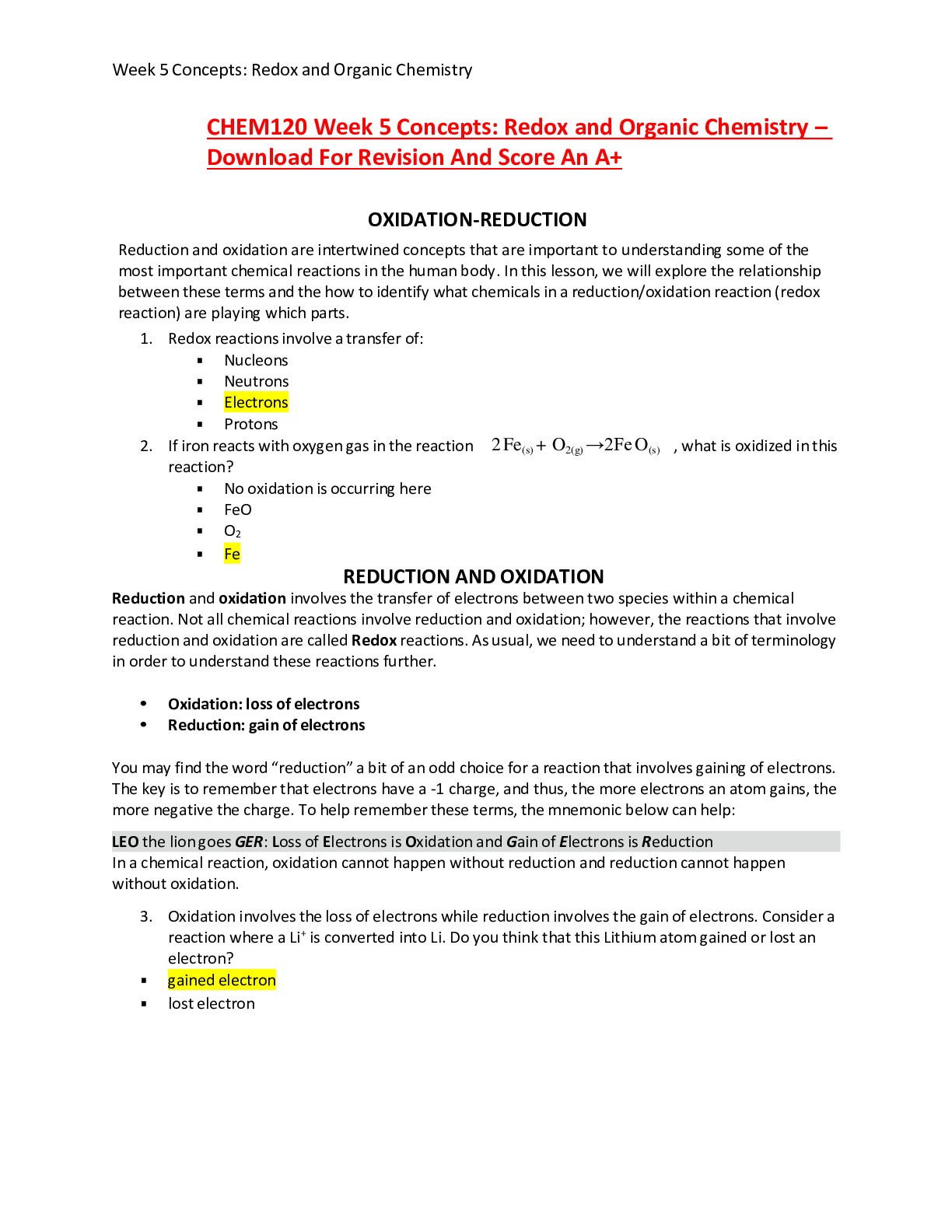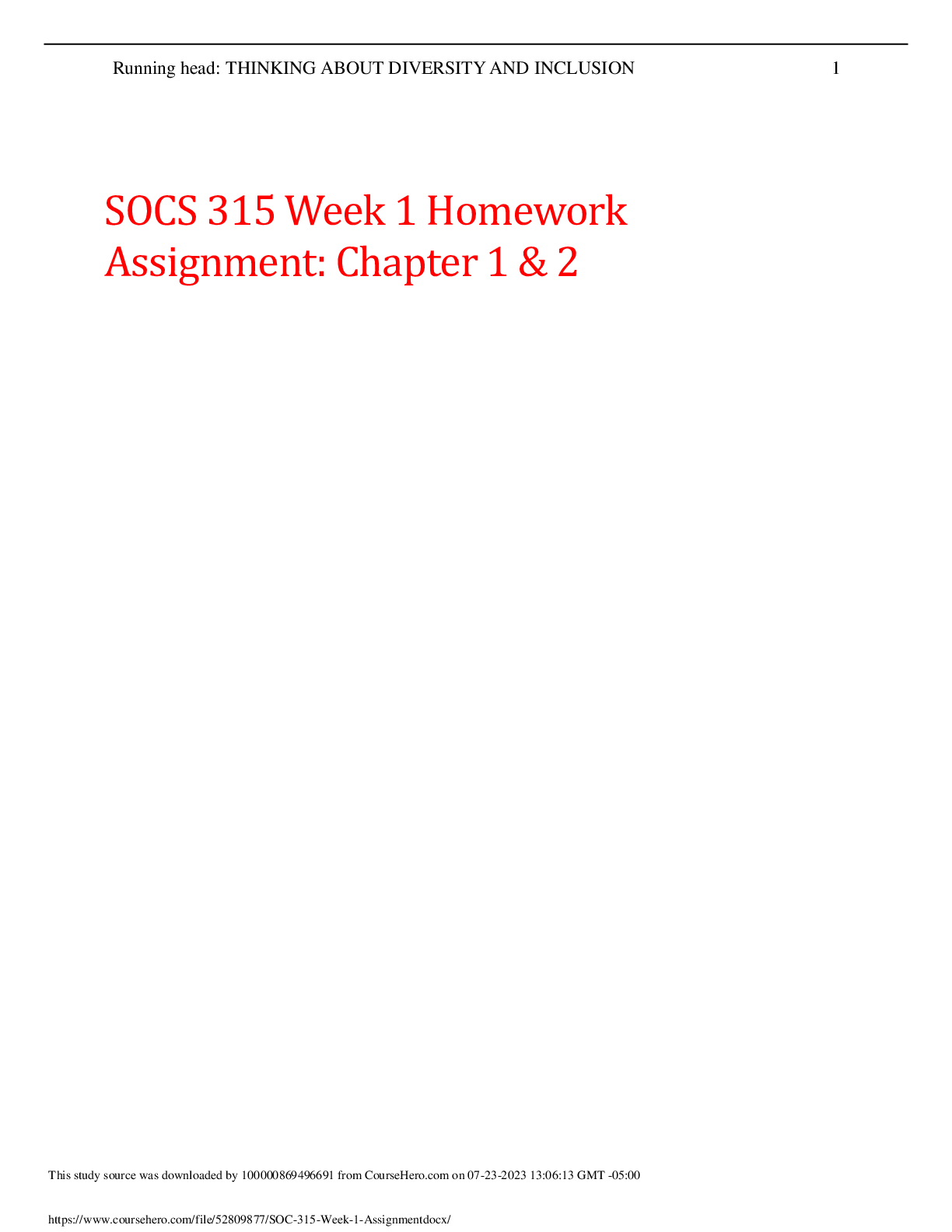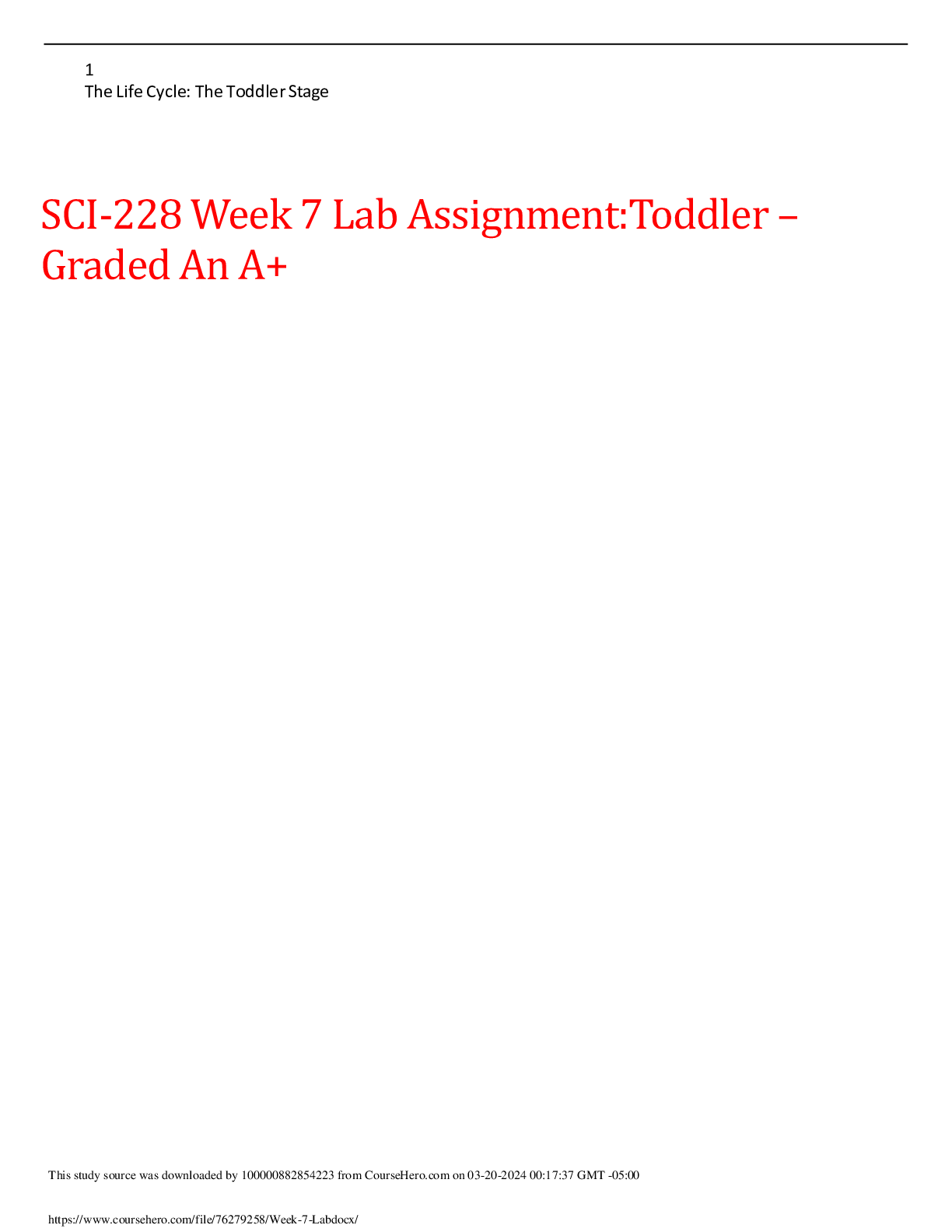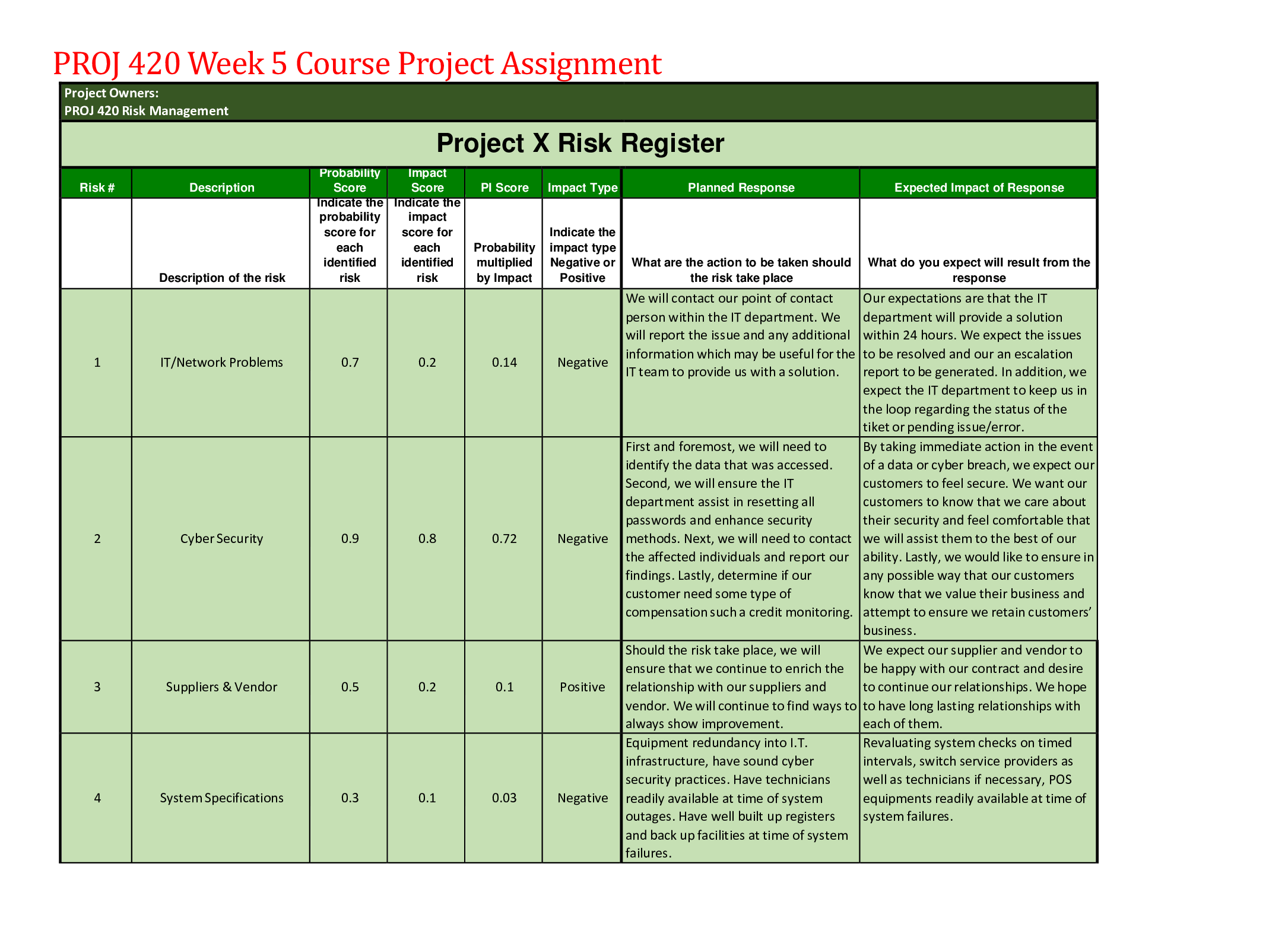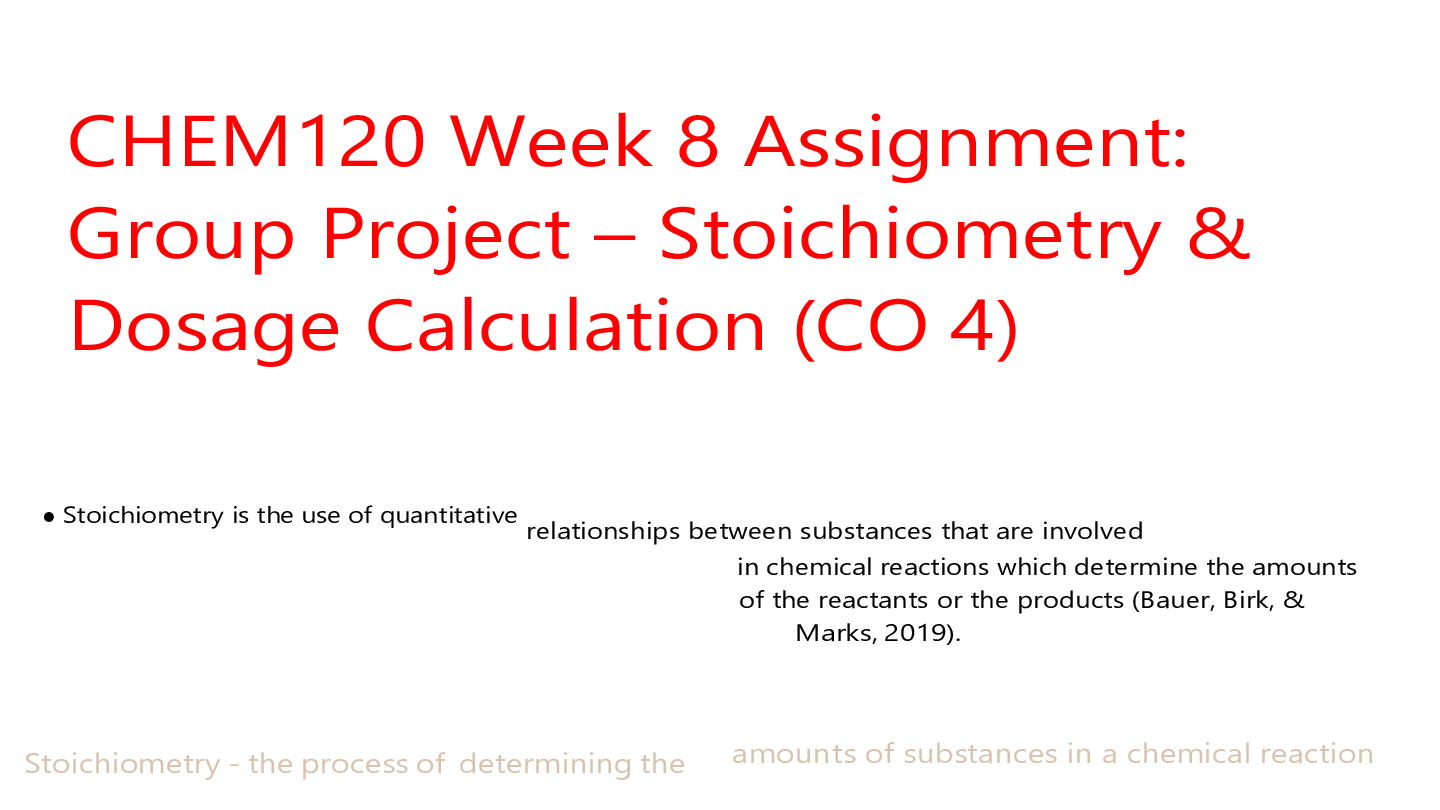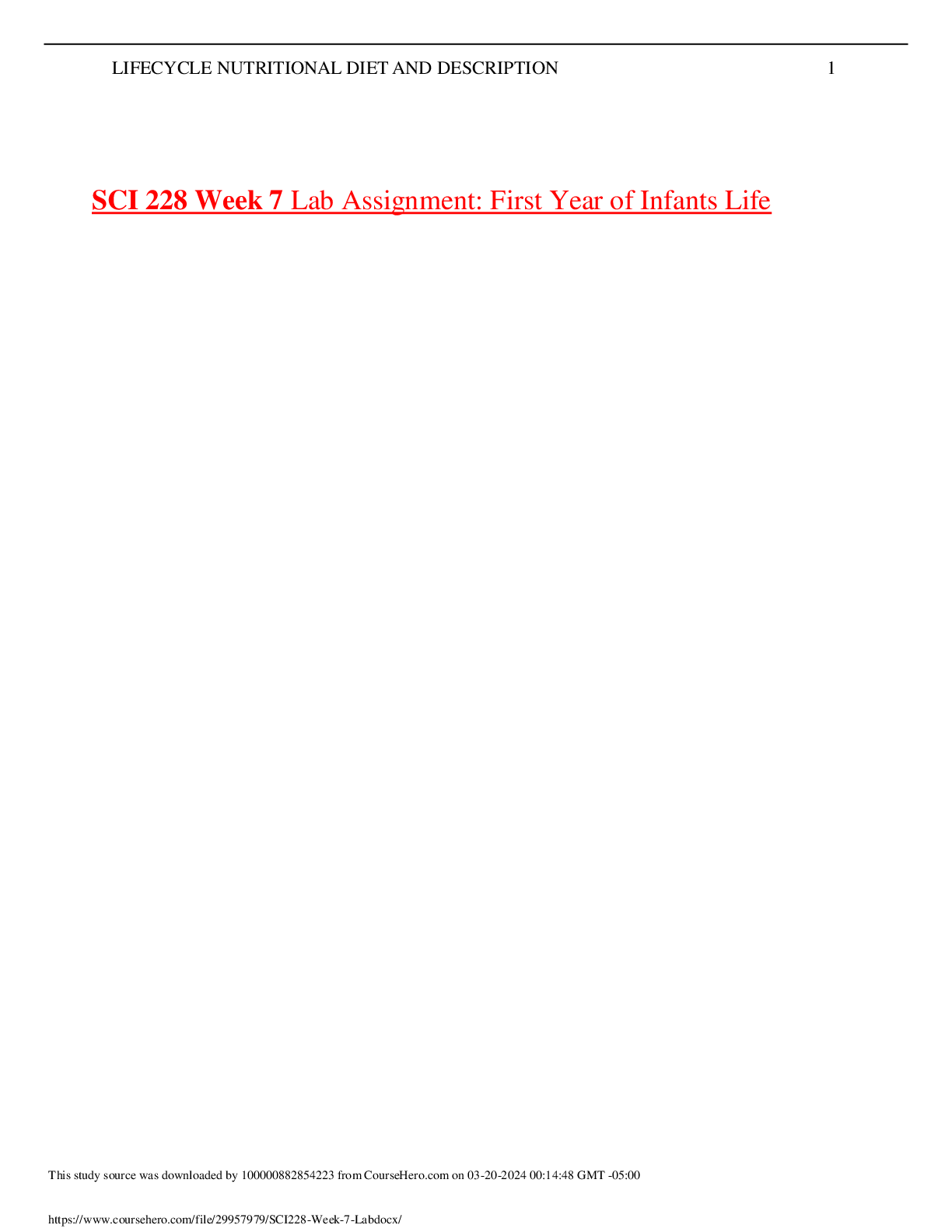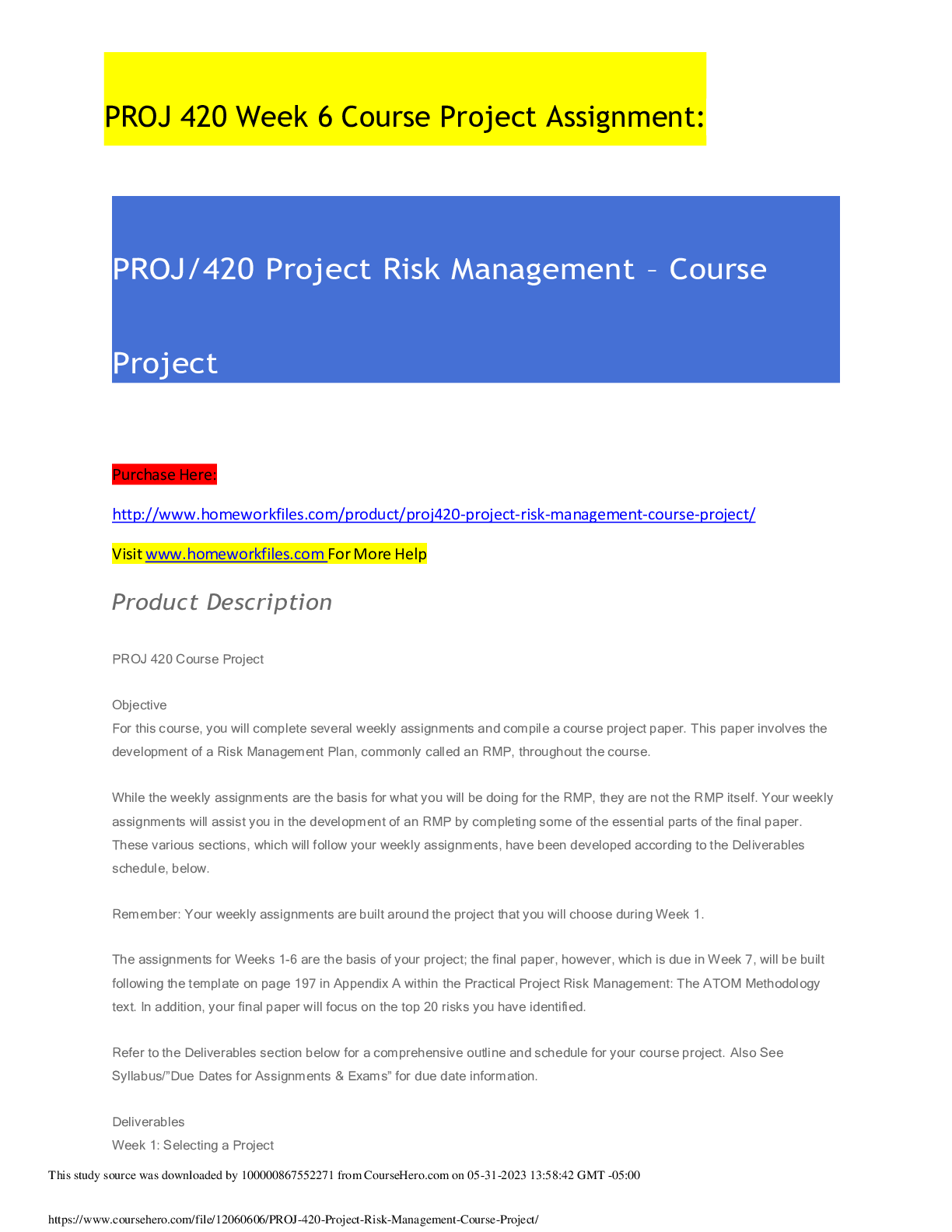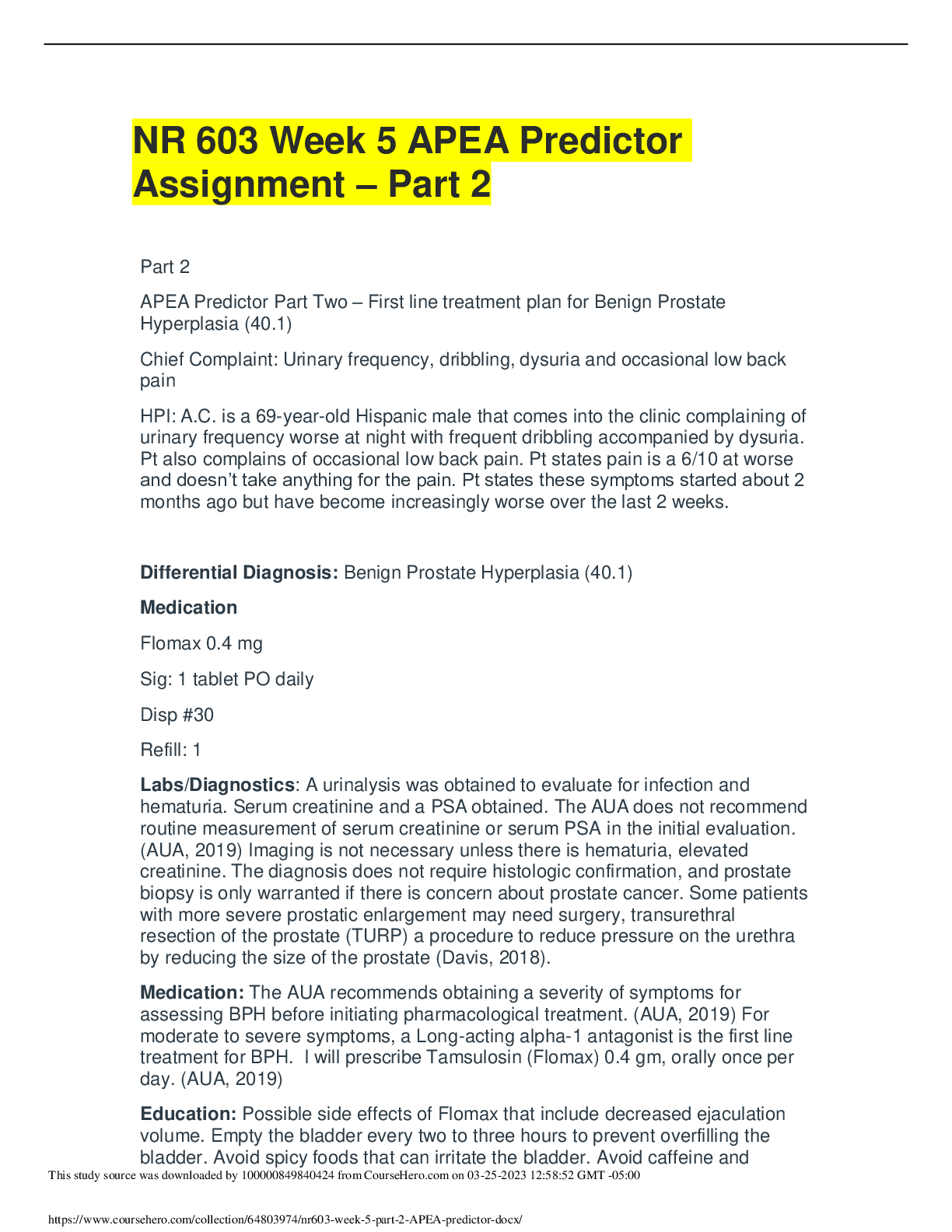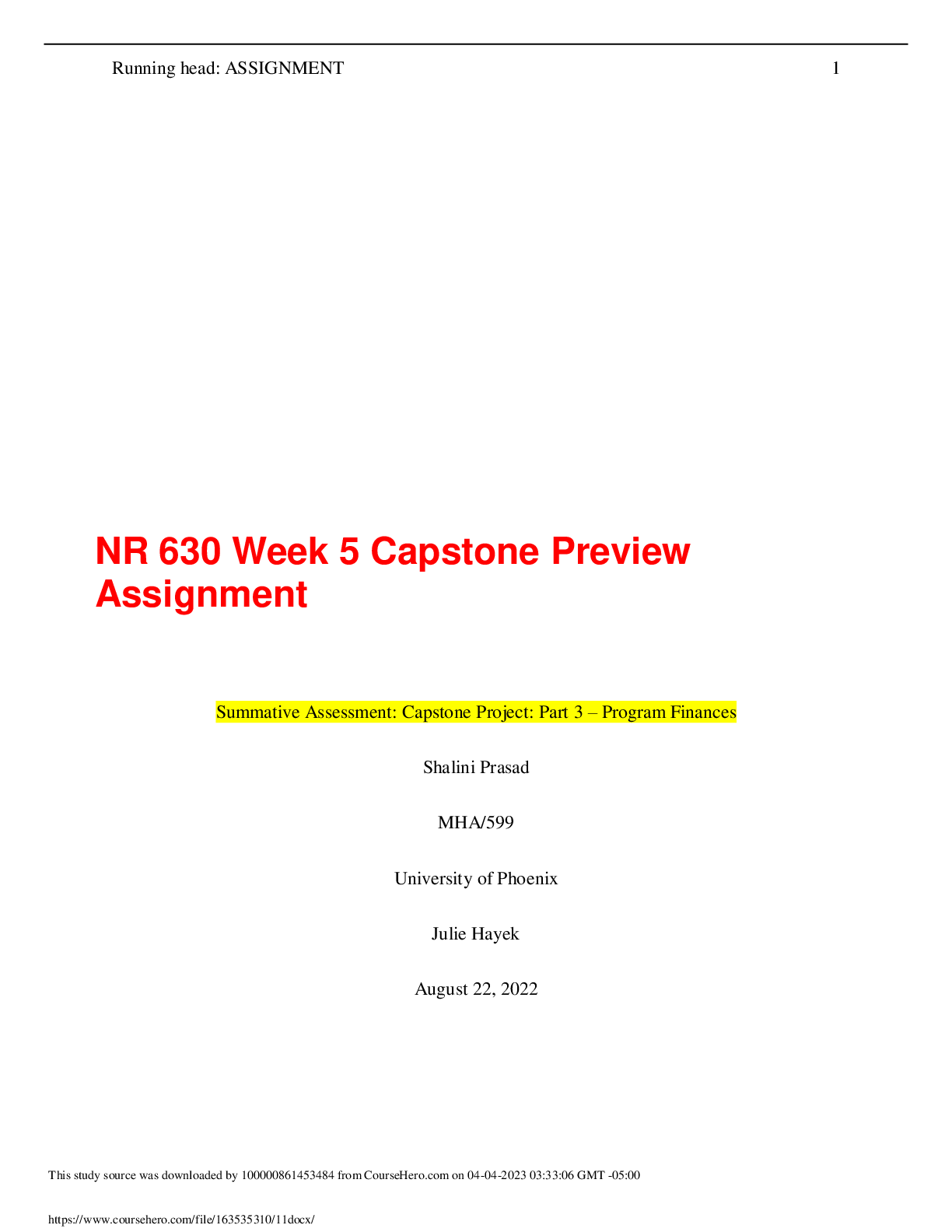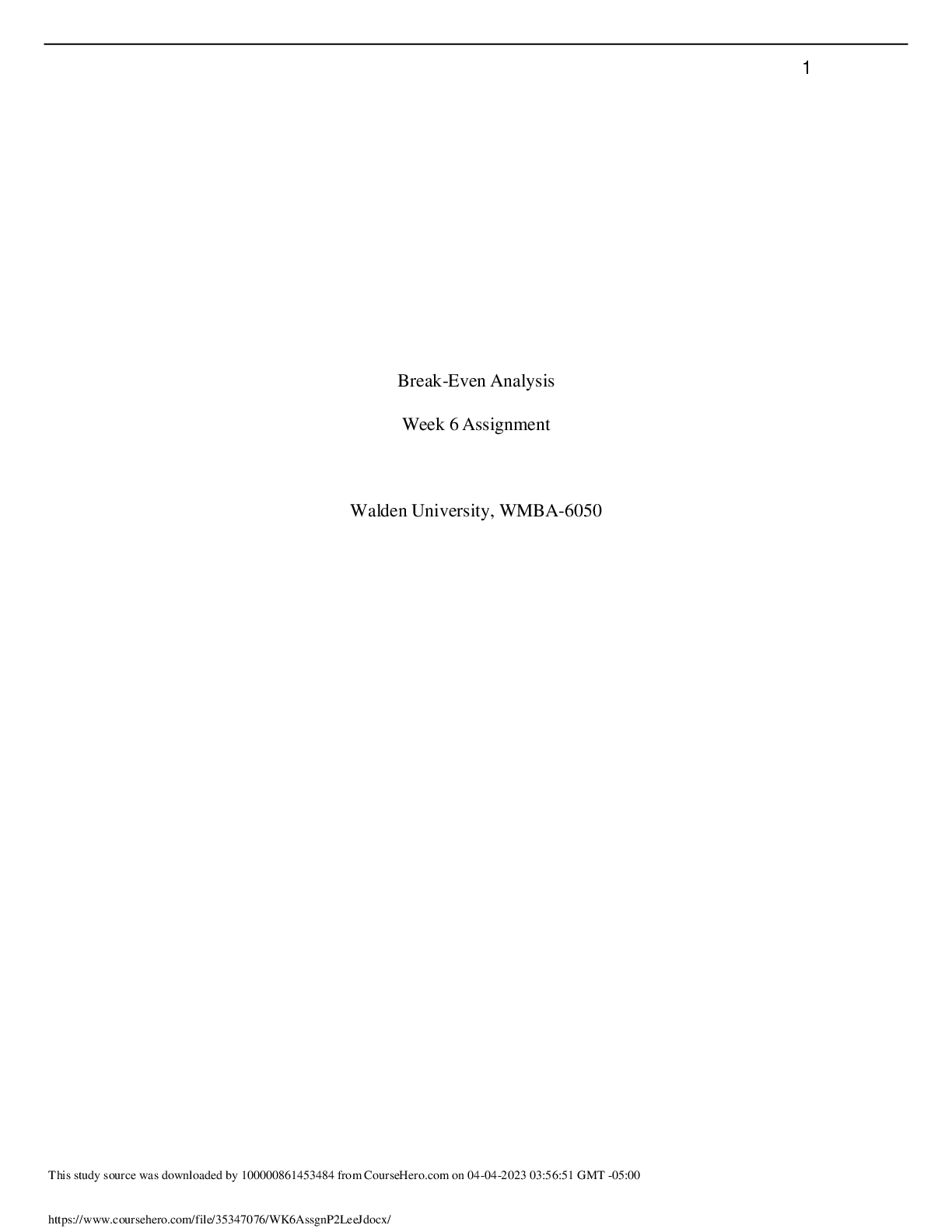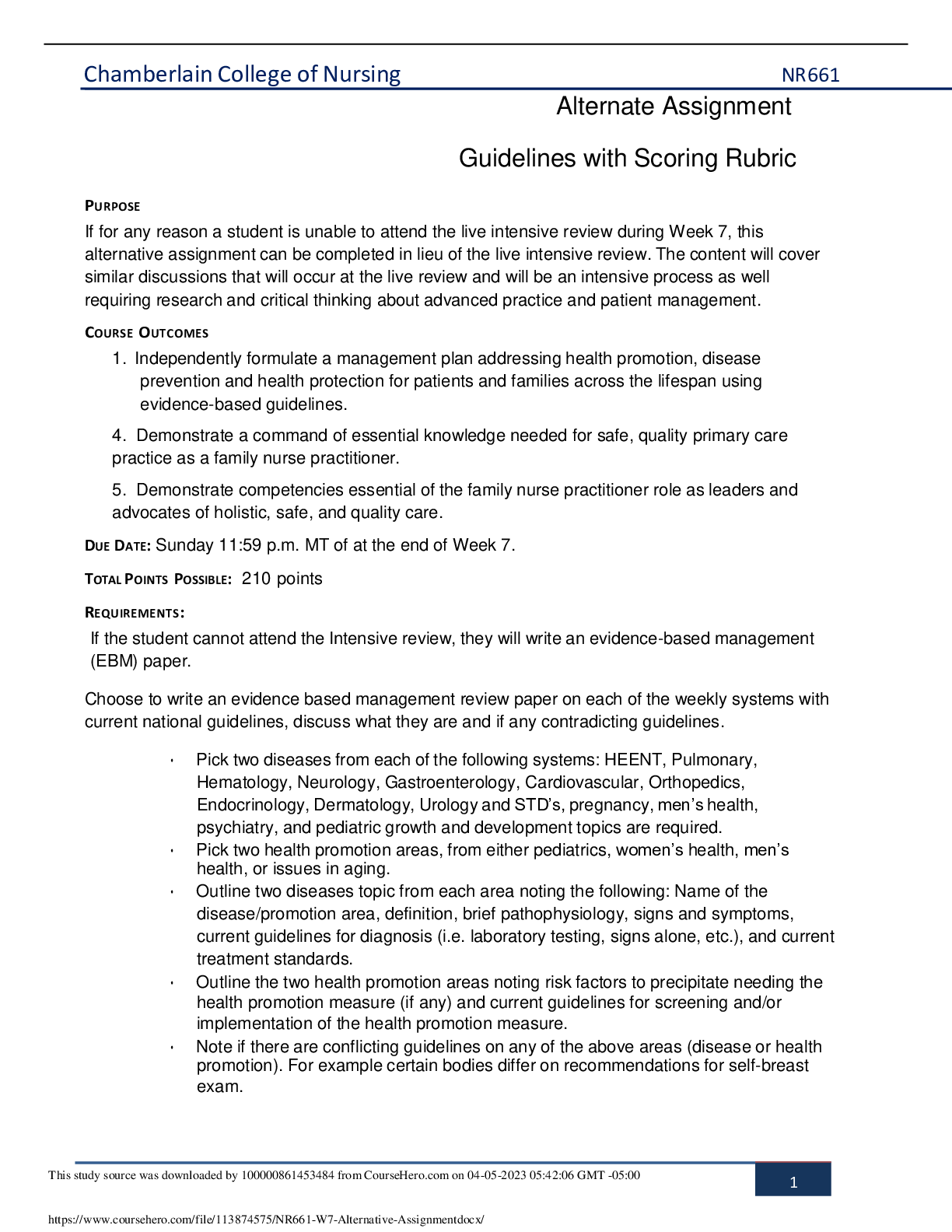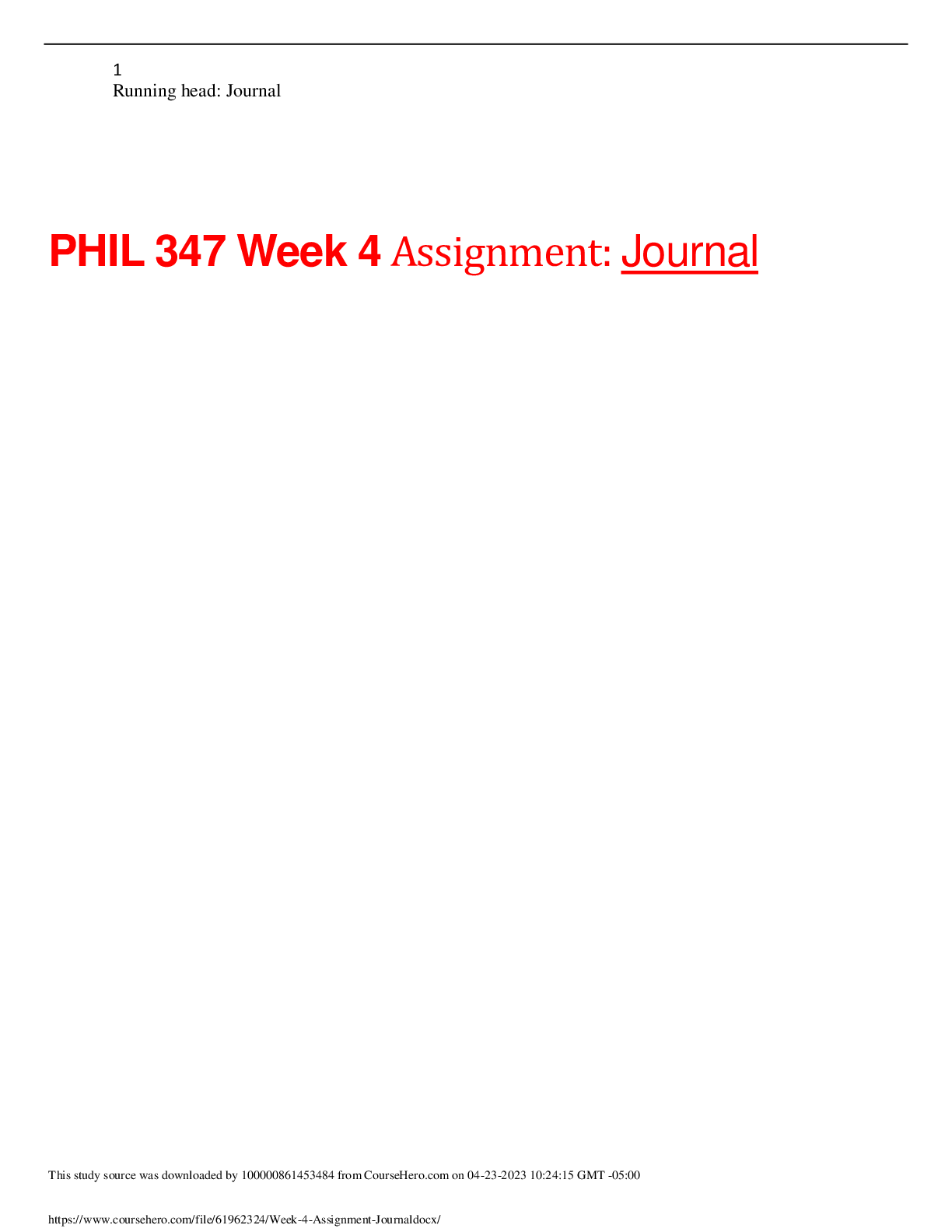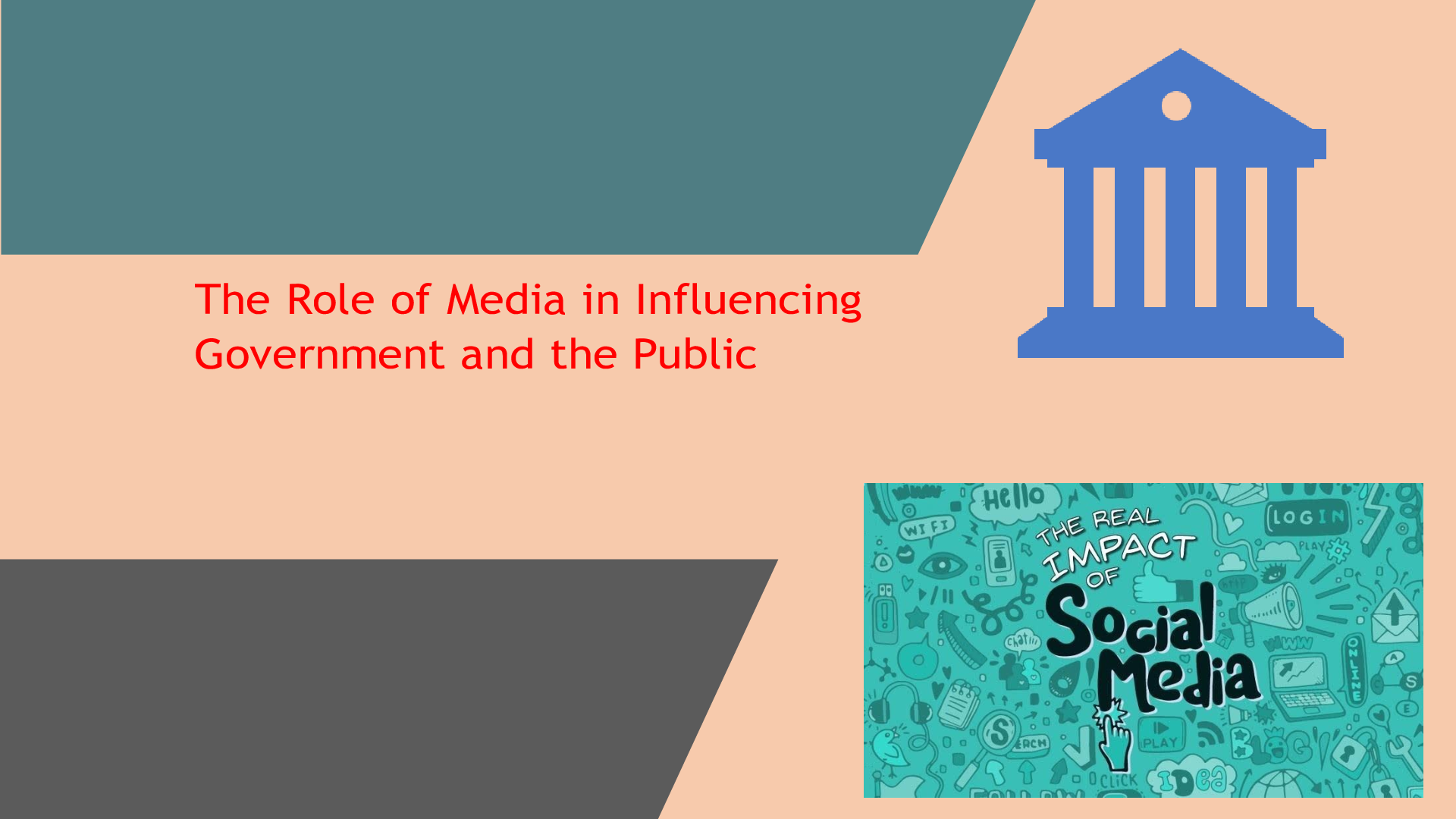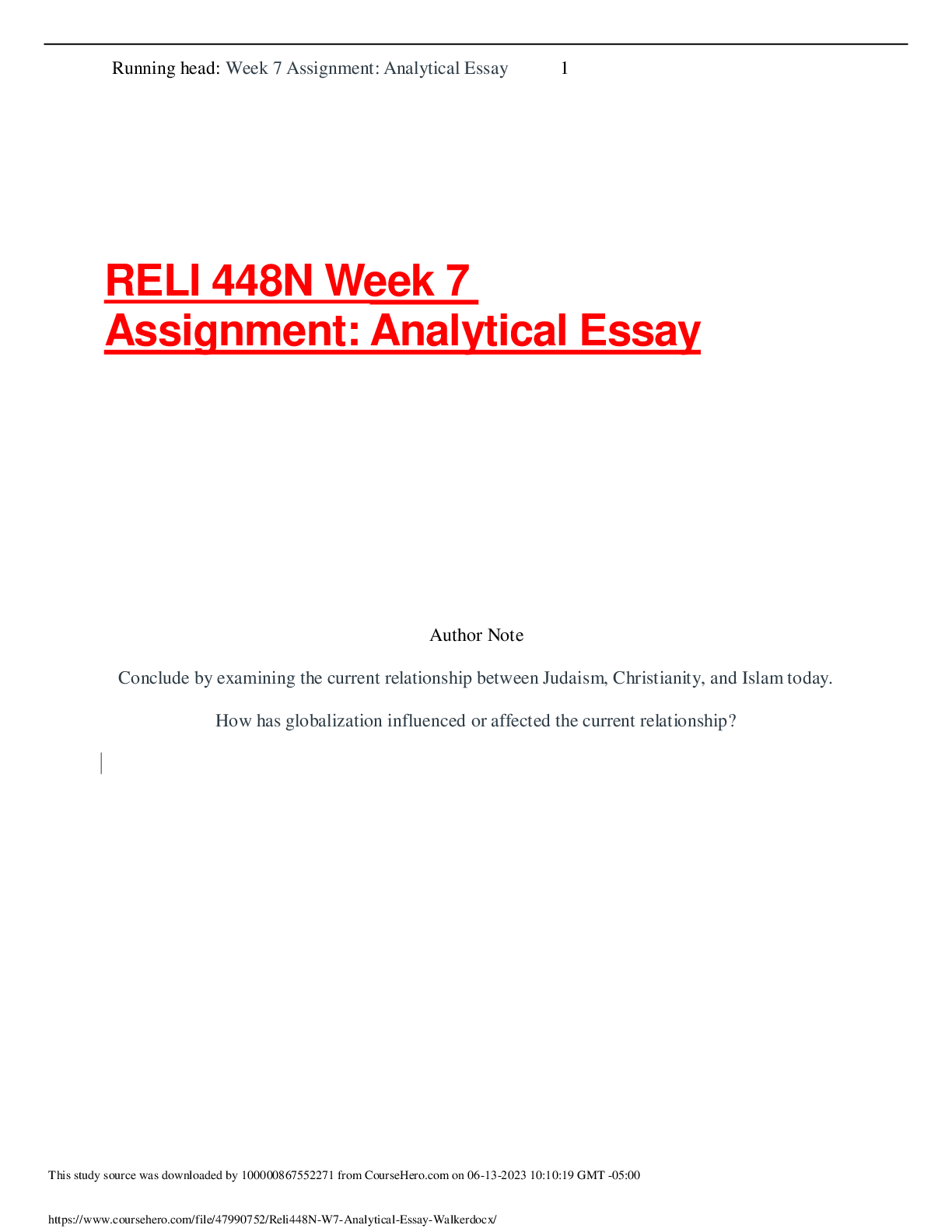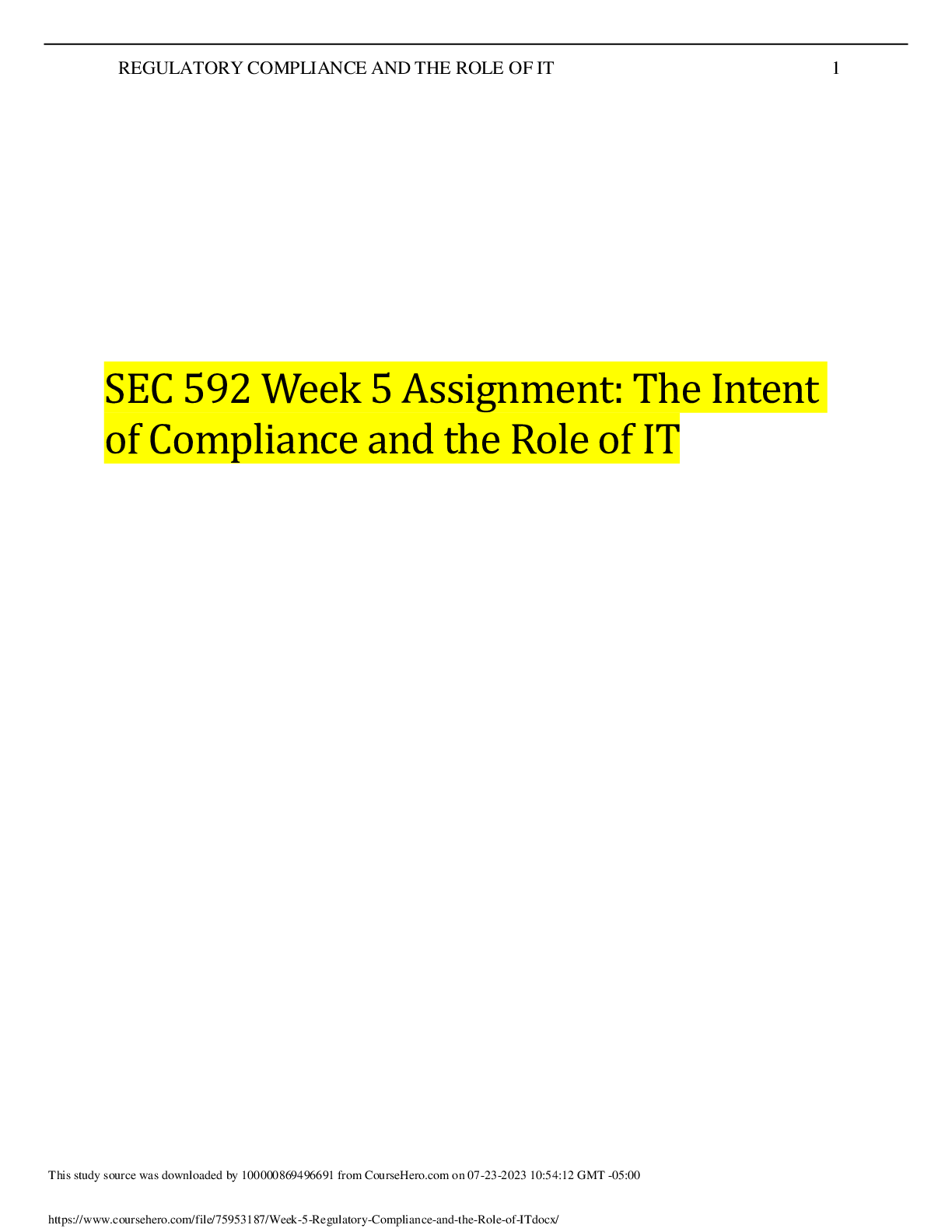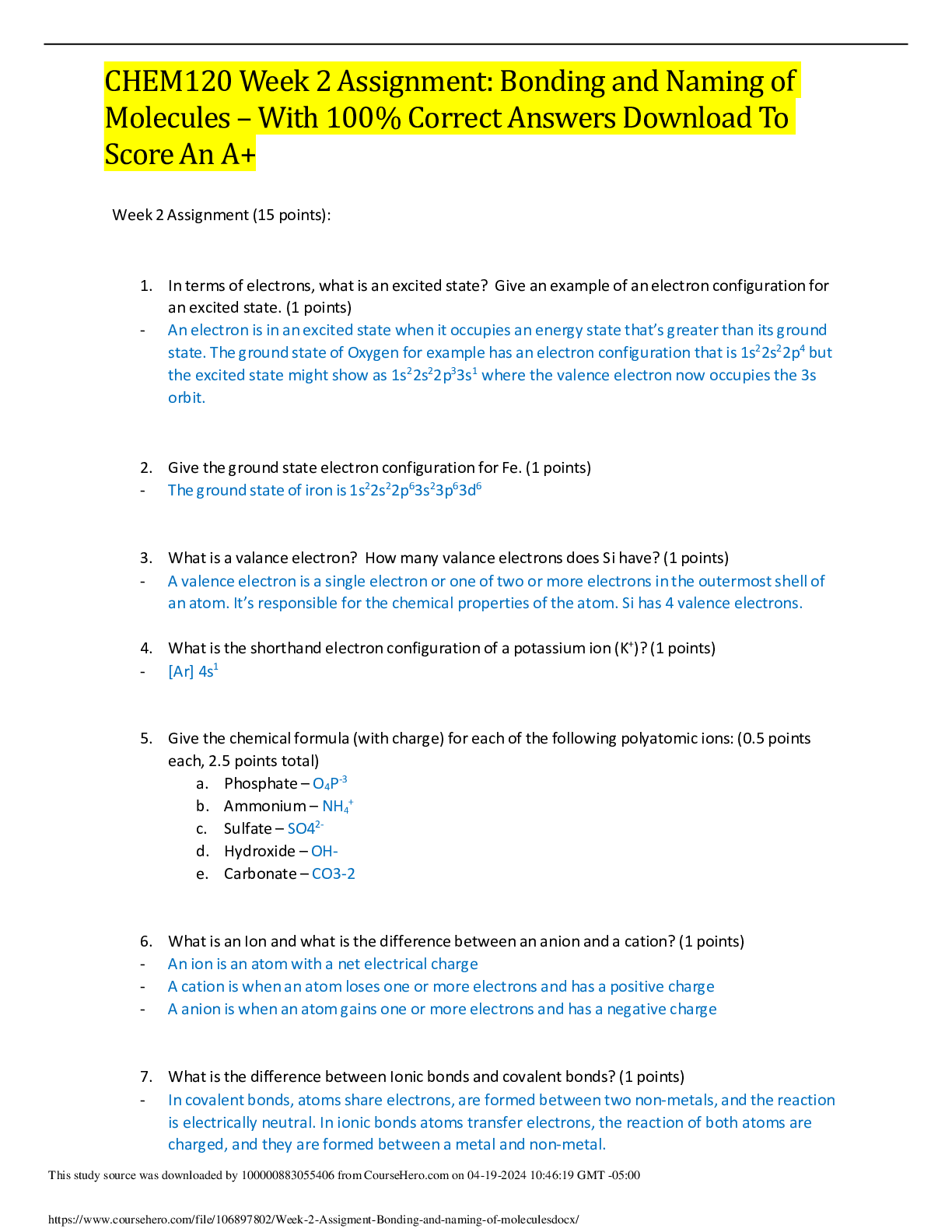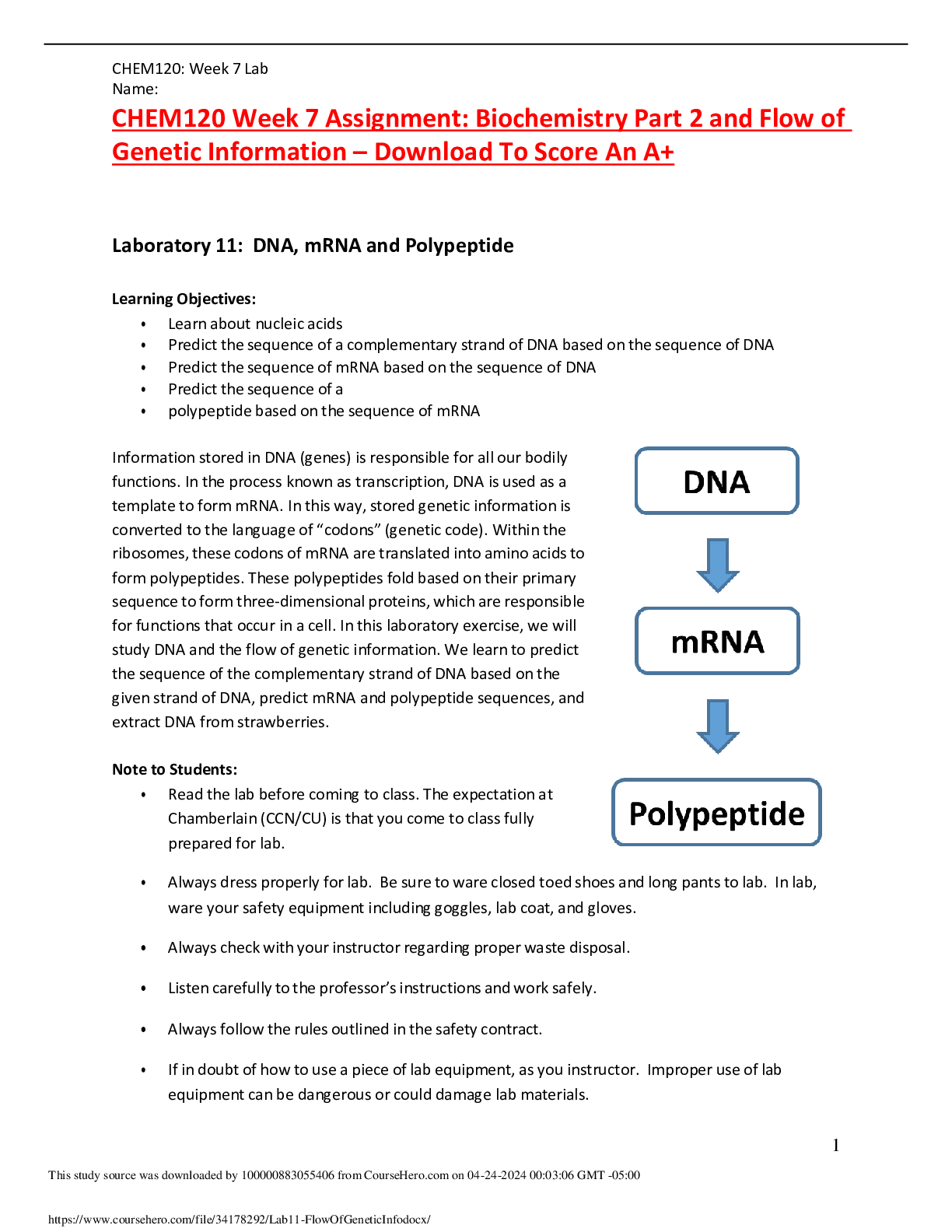AMERICAN HISTORY > ASSIGNMENT > HIST 405N Week 5 Case Study Assignment Option 3: World War I – Download To Score An A+ (All)
HIST 405N Week 5 Case Study Assignment Option 3: World War I – Download To Score An A+
Document Content and Description Below
HIST 405N Week 5 Case Study Assignment Option 3: World War I – Download To Score An A+ Week 5 Assignment Case Study Option 3: World War I World War I, also known as the First World War or ... the Great War was an international conflict that occurred between 1914 – 18, embroiling most of the European nations, Russia, the United States, the Middle East as well as other regions (Royde-Smith & Showalter, 2020). At one end of the war were the Central Powers that mainly included Germany, Turkey, and Austria- Hungary. On the other end of the war were the Allied Powers that included Great Britain, France, Italy, Russia, Japan, and the United States, which joined the war in 1917. The two sides fought over several issues that began with the assassination of Archduke Franz Ferdinand of Austria and ended with the defeat of the central powers and the death of more than 16 million people (History.com, 2021). The Origins of the World War I World War I began in 1914 after the assassination of Archduke Franz Ferdinand of Austria by a Serbian nationalist, Gavrilo Princip, on June 28, 1914 (Royde-Smith & Showalter, 2020). However, the exact causes of the war have caused raging debate among historians and policymakers with some studies arguing on the perspective of a European-centered changing distribution of power while others proposed that the war resulted from a structural crisis (Anievas, 2013). The lack of a consensus on the origins of World War I also make it had to determine whether the War was avoidable or not (Bender, 2014). History indicates that the tensions had been brewing throughout Europe for years before the Great War broke. The tensions had been more intensified especially in the troubled Balkan region of southeast Europe where political instability threatened the alliances among the European powers, Russia, the Ottoman empire, and other parties that had existed for years (History.com, 2021). The assassination of Archduke Franz Ferdinand only served to ignite these tensions into World War I. Austria- Hungary declared war on Serbia A July 28, 1914, and the Russian mobilization as a Serbian ally, the German invasion of Belgium, and other factors affecting bilateral and multilateral relations between nations led other countries like Russia, France, Great Britain, and Japan to join the war. The neutrality of the United States in World War I Since the outbreak of World War I in 1914, the United States had remained on the sidelines with President Woodrow Wilson adopting the policy of neutrality in favor of continuing commerce and shipping with the European countries on both sides of the conflict (History.com, 2021). However, maintaining neutrality became increasingly impossible due to the escalating German submarine aggression, sinking several U.S. merchant ships that the to the U.S. declaring war against Germany on April 2, 1917. Maintaining this neutrality would have been impossible considering the increasing German aggression and the public opinion against Germany. Many of the American immigrants from Europe still bore strong attachments and feelings towards their countries of origin. Moreover, the Americans were sending loans and arms to the allied powers, undermining their claim for neutrality. America would also be forced to join the war after German launched the policy of unrestricted U-boat warfare where all shipping was could be attacked and they also secretly sought to enter an alignment with Mexico against the United States, further offending the Americans. Should the United States have entered World War I to make the World Safet for Democracy? President Woodrow Wilson was a progressive who embraced the idea that a perfect world would be achieved by spreading democracy and adopting a greater international outlook (Williams, n.d.). In his progressive vision, the war would serve as a conduit for spreading democratic principles, ending autocratic regimes. President Wilson felt the “the world must be safe for democracy” and by entering the war, they would champion mankind’s rights by freeing the German people after defeating Germany. The President believed that it was America’s responsibility to fight for the ultimate world peace and to liberate the people of the world. He articulated these ideas during the Versailles conference, proposing the formation of the League of Nations to prevent future wars and to ensure world peace. However, his vision failed to come to fruition when the United States’ Senate refused to ratify the Treaty of Versailles in the interest of defending the American national sovereign power. Also, over the next 20 years after the treaty, there was an increased spread of totalitarian, fascist, and communist regimes as opposed to progressive democracies. As a result, it can be argued that entering World War I was not the ideal way to “make the world safe for democracy.” The Fairness of the Treaty of Versailles At the end of World War I, the Treaty of Versailles was signed in June 1919 at the Palace of Versailles in Paris. Meant to ensure lasting world peace, the treaty codified the terms of peace between Germany and the victorious allied powers (Farmer, 2018). Germany, having been defeated, was blamed for starting the war and it was harshly penalized. The impact of the penalties was that Germany lost territory including its African colonies, was made to make massive reparation payments to some allied countries, and it was made to limit its military. The treaty was thus unfair to Germany, which felt tricked into signing the deal. As a result, the growing hatred for the Treaty of Versailles would make it ineffective in maintaining lasting world peace as in the years that followed it would be counted as one of the reasons for World War II. Should the United States’ Senate Have Approved the Versailles Treaty? To defend the American National sovereign power, the US senate refused to sign the Treaty of Versailles (Farmer, 2018). The feeling among most American nationalists was approving the treaty would force the US to join the league of nations and with the argument that future conflicts are inevitable, the US would have been forced to fight in another war as an obligation to an ally. However, the Senate should have approved the treaty since, without the US, the world’s newest superpower at the time, the League of Nations was left weak and doomed to failure, setting the stage for a more devastating and bloodier clash. The US would have helped prevent World War II if it had joined the League of Nations. Conclusion World War I was one of the greatest conflicts in the world that pitted the allied powers (Great Britain, Russia, France, Italy, Romania, Japan, and, by 1917, the United States) against the Central Powers (Germany, Austria-Hungary, the Ottoman Empire, and Bulgaria). The conflict lasted between 1914 and 1918 and it resulted in allied powers claiming victory and the loss of more than 16 million lives. The Treaty of Versailles signed in 1919 to form the League of Nations and ensure a lasting world peace failed to achieve fairness, setting the stage for an even bloodier and more devastating war. References Anievas, A. (2013). 1914 in world historical perspective: The ‘uneven’and ‘combined’origins of World War I. European Journal of International Relations, 19(4), 721-746. Bender, J. (2014, Jul 28). Henry Kissinger: World War I Was 'Structurally Unavoidable'. https://www.businessinsider.com/kissinger-and-albright-world-war-i-2014-7?IR=T Farmer, B. (2018). The Treaty of Versailles and the Rise of Nazism. New American (08856540), 34(21), 33–38. https://chamberlainuniversity.idm.oclc.org/login? url=https://search.ebscohost.com/login.aspx? direct=true&db=a9h&AN=132888411&site=eds-live&scope=site History.com (2021, Jan 13). World War I. https://www.history.com/topics/world-war-i/world- war-i-history#section_17 Royde-Smith, J. G., & Showalter, D., E. (2020, Nov 2). World War I. Encyclopedia Britannica. https://www.britannica.com/event/World-War-I Williams, T. (n.d.). “Make the World Safe for Democracy”: President Woodrow Wilson and American Intervention in World War I. https://constitutingamerica.org/make-the-world- safe-for-democracy-president-woodrow-wilson-and-american-intervention-in-world-war- i-guest-essayist-tony-williams/ [Show More]
Last updated: 3 days ago
Preview 3 out of 6 pages

Loading document previews ...
Buy this document to get the full access instantly
Instant Download Access after purchase
Add to cartInstant download
We Accept:

Reviews( 0 )
$12.00
Document information
Connected school, study & course
About the document
Uploaded On
Jun 26, 2024
Number of pages
6
Written in
Additional information
This document has been written for:
Uploaded
Jun 26, 2024
Downloads
0
Views
6

